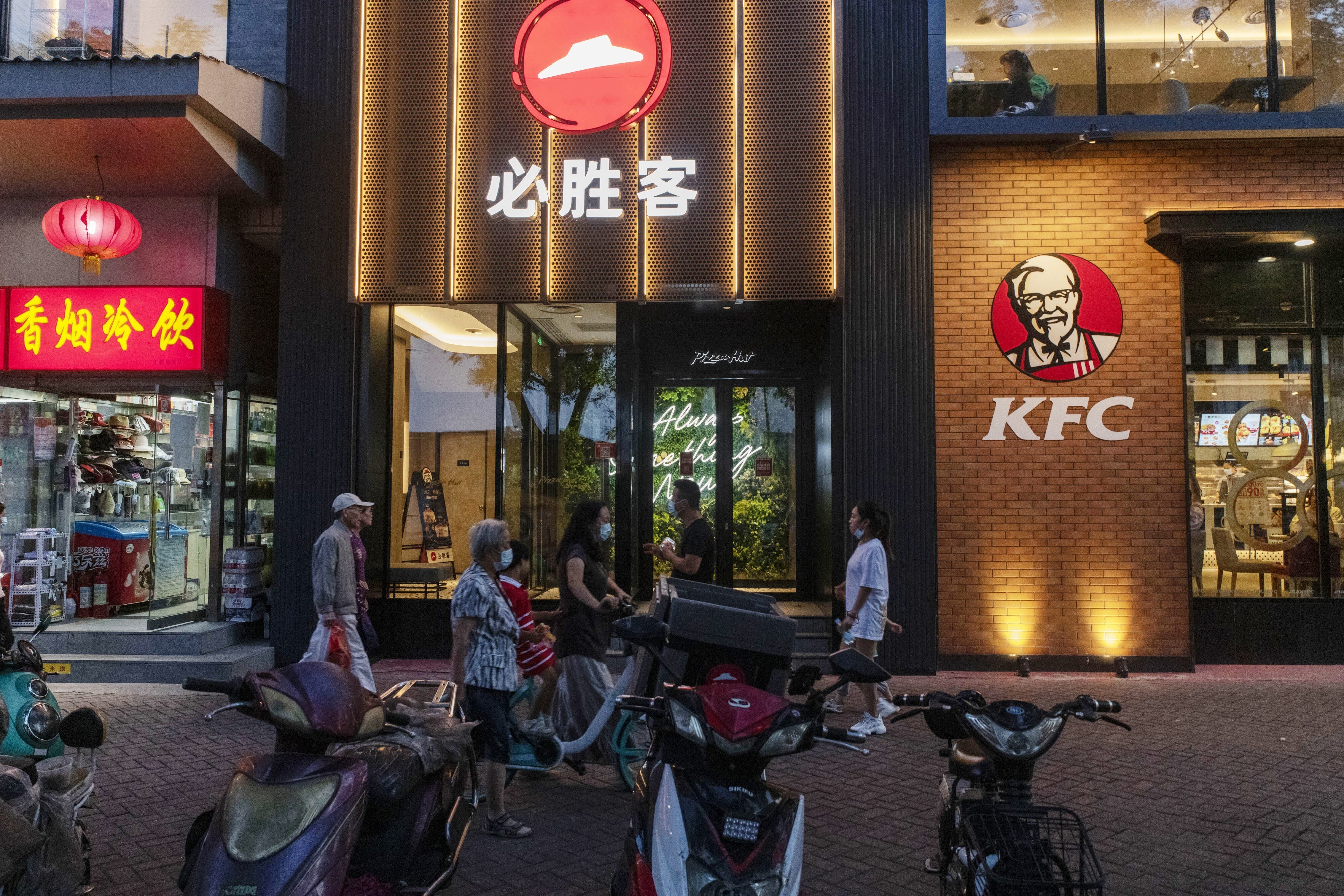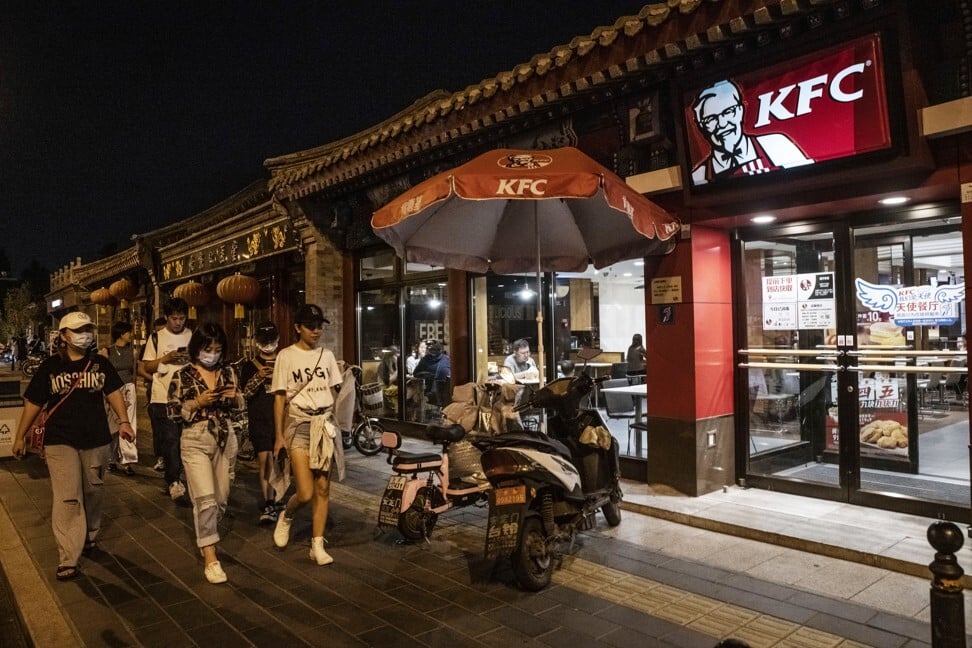Companies
Yum China flops in Hong Kong debut amid lingering questions about strategy for KFC, Pizza Hut to overcome Covid-19 slump
Shares of the Shanghai-based company began trading at HK$410, a slight discount to the HK$412 that they were offered at in their HK$17.27 billion (US$2.23 billion) secondary listing on the Hong Kong stock exchange
The stock fell by as much as 6.3 per cent to an intraday low of HK$386.20 in recent trading, ending the day at HK$390.20
Daniel Ren
Alison Tudor-Ackroyd
Daniel Ren in Shanghai and Alison Tudor-Ackroyd
Published: 12:00pm, 10 Sep, 2020

Pedestrians walk past a Pizza Hut restaurant and a KFC restaurant, both operated by Yum China Holdings in Beijing on Saturday, Sept. 5, 2020. Photo: Bloomberg
Yum China Holdings, the owner of the KFC and Pizza Hut restaurant chains in China, got off to a bumpy start in its Hong Kong trading debut when its stock became the first in a long while to open at a loss.
Shares of the Shanghai-based company began trading at HK$410, a slight discount to the HK$412 that they were offered at in their HK$17.27 billion (US$2.23 billion) secondary listing on the Hong Kong stock exchange. The stock fell by as much as 6.3 per cent to an intraday low of HK$386.20 in recent trading before ending its first trading day at HK$390.20 to record an unusual loss for retail investors who have subscribed to it.
“The first-day performance was slightly below market expectations, but it would not damp investors’ enthusiasm in secondary listings,” said He Yan, a hedge fund manager with Shanghai Shiva Investment. “Companies with strong consumer awareness on the mainland are among the favourite stocks for Chinese investors.”
The flop in Yum China’s Hong Kong debut draws a stark contrast with a spate of bumper initial public offerings (IPO) in the city, where stocks gained 50 per cent or more in value when they changed hands for the first time. Just this week, Nongfu Spring successfully completed its HK$8.35 billion IPO, setting the record as the most overbought offer in Hong Kong’s financial history with 1,147 times more investors submitting bids than available shares. The water bottler’s stock debuted at an 85 per cent premium to its offer price.
Yum China’s offering comes as restaurants worldwide are still struggling with social distancing regulations to contain the global coronavirus pandemic.
The chain is betting that its franchise of 10,000 restaurants across 1,400 cities and townships in mainland China stand a better chance of succeeding than other markets, as the nation became the first major economy to emerge from the coronavirus lockdown.

Pedestrians walk past a KFC restaurant operated by Yum China Holdings in Beijing on Saturday, Sept. 5, 2020. Photo: Bloomberg
The Covid-19 pandemic has posed a huge challenge to the restaurant industry and investors were keen on hearing answers to the question of how the management weathered through the challenges and recovery of operating results, said Huang Peihao, head of equity capital markets in Asia for UBS.
“Through a secondary listing in Hong Kong, the company attracted Asian time-zone investors, including those from Hong Kong, mainland China, and Singapore. The secondary listing also facilitates a closer tie with Yum China’s customers,” said Huang, whose bank UBS is joint global coordinator with Goldman Sachs, Citigroup and CMB International for Yum China’s stock offer. “We believe these will support the company‘s medium and long-term development.”
For now, investors appear unconvinced. The Hong Kong shares fell by as much as 3 per cent on the Bright mart grey market overnight, before transactions formally began in the city, signalling that the stock would open at a discount. Yum China’s US-traded American depositary receipts rose 1.7 per cent overnight to US$53.20 in New York.
Yum China posted a 51.5 per cent drop in profit for the first six months of this year, earning US$194 million.
The company granted the underwriters of its international offering an overallotment option to purchase up to an additional 6.3 million shares at the offer price. If the overallotment is fully exercised, the company would raise an additional HK$2.56 billion.
Daniel Ren
Daniel Ren is the SCMP's Shanghai bureau chief. A Shanghai native, Daniel joined the SCMP in 2007 as a Business reporter.
Alison Tudor-Ackroyd
Alison is the Post's Finance Editor. Previously, she was Managing Editor of FinanceAsia; The Wall Street Journal's Asia Pacific Senior Finance Correspondent and before that Reuters' Asia Private Equity Correspondent. She has more than 20 years' experience reporting on finance while based in London, Milan, Paris, Tokyo and now Hong Kong. Alison has moderated panels at numerous summits from Sibos, Milken to Rise. In 2018, she was named Fintech Journalist of the Year and won Outstanding Contribution to Journalism in Asian press awards.






 Reply With Quote
Reply With Quote